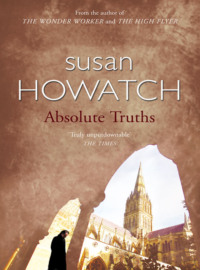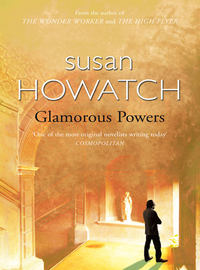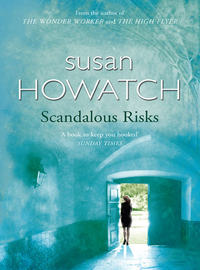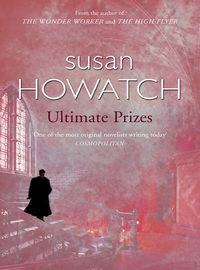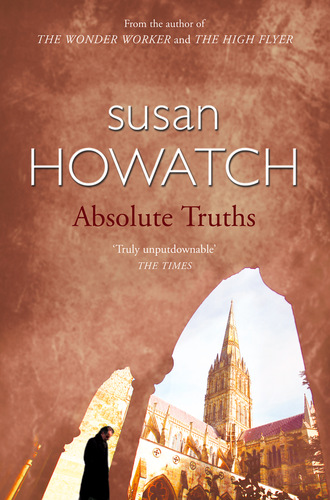
Полная версия
Absolute Truths
‘I must say I think this is a singularly distasteful conversation for a bishop to have with his wife!’
‘Don’t waste any more time thinking, Charles – ACT!’
‘Very well.’ I replaced the receiver, marched out of the room and almost collided with the housekeeper who had been approaching with my tea. Thanking her profusely I returned to the study, but as soon as the tray had been deposited on the desk and the housekeeper had once more retreated to the kitchen, I made another swift exit into the hall.
As I padded silently upstairs I was aware of the size of the house, built for a large Victorian family with several servants, and it occurred to me that this size was enhanced by the interior dilapidation which underlined the high ceilings, the wide staircase and the long corridors. I suspected the housekeeper neither dusted nor swept, probably because Desmond had never noticed whether she did so or not. Upstairs the cold intensified. Stooping over the floor in one corner of the landing I flicked open my lighter and saw the mice-droppings beside the hole I had noticed in the wainscoting. The notorious lines of a well-known hymn flared in my mind: ‘The rich man in his castle, the poor man at his gate; God made them high and lowly, and ordered their estate.’ I thought of my comfortable home and felt not only guilty but angry and ashamed.
I told myself that something should be done for the parish, but I knew the problems it presented were intractable. The diocesan board of finance had already classed the church as a white elephant which required too much money too often. The congregation had dwindled to a remnant. It was hardly surprising that the vicarage was now a mere sordid niche for a man whom no other bishop would employ, but how I hated that long decline from Victorian power to mid-twentieth-century enfeeblement! It made me despair of the future of the Church.
But then I remembered St Athanasius, battling on contra mun-dum, never giving up, never sinking back into despair, and it occurred to me that I should stop bewailing the present in disgust and pray for the future with hope. So I said in my head to God: ‘Breathe new life into this parish – resurrect it from the dead!’ – an outrageous demand indeed and I hardly hoped for it to be met, but no attempt to align oneself with God can ever be futile, and perhaps the result of my prayer would be that in future I would take more interest in this dying parish, a move which would produce beneficial results for the congregation.
To finish off my prayer I added my current mantra: ‘All things work together for good to them that love God,’ and feeling fractionally calmer – or was I in fact more depressed than ever? – I resumed my journey to Desmond’s bedroom.
VI
In contrast to the chaos in the study, this room was uncluttered. It was as if Desmond had created a small, austere space where he could escape from a world which demanded too much of him. The narrow bed had no counterpane and no eiderdown and the top blanket looked as if it had come from an army surplus store. A dressing-gown, frayed at the cuffs, hung from a hook on the back of the door, but all his other clothes had been consigned to the wardrobe. Beside the bed I saw the Missal of the Fordite monks – Jon’s old Order – stacked with the Bible and the Book of Common Prayer. An alarm clock nearby was so weathered by the vicarage climate that the metal had rusted at the base.
I noted the prie-dieu by the window, the crucifix above the bed, and suddenly as the aura of a devout life permeated my consciousness I felt as if Christ himself were watching me from some corner of the room which lay just beyond my field of vision.
Immediately I asked myself what Jesus would have thought of this shoddy episcopal invasion of a devout man’s monk-like cell, but my task at that moment, as Lyle had so forcefully reminded me, was not to think but to act. I picked up the Missal and shook it but no pornographic photograph or incriminating letter fell from the pages. Desmond had wanted to be an Anglican monk long ago, but when the Fordites had turned him down he had decided he was called to parish work after all. But had that decision of the Abbot-General been correct? Perhaps if the Order had accepted him … But I was wasting time in thought again. Setting down the Missal, I shook the Bible and the Prayer Book with equally unproductive results and opened the drawer of the bedside table, but I found nothing there except indigestion tablets. I examined the drawers inside the wardrobe but the majority were empty. Desmond had even fewer clothes than I had imagined.
However I noticed that in the section of the wardrobe where his one suit and spare cassock were hanging, a tin box was sitting on the floor alongside a down-at-heel pair of shoes. It was the sort of box, about fifteen inches high, in which people kept personal memorabilia such as old letters and family photographs, but when I tried to raise the lid I was unable to do so. Kneeling on the threadbare carpet I flicked open my lighter again and confirmed that although the hasps were unfastened a lock was holding the lid in place. I told myself that it was not unnatural for Desmond to wish to keep his personal memorabilia from the housekeeper’s prying eyes, but the locked box bothered me and I became even more bothered when I was unable to find the key.
I felt along the top of the wardrobe but my fingers encountered nothing but dust. I stood on a chair so that I could see the top of the picture-rail and door-frame, but no trace of metal glinted among the cobwebs. I lifted up the box and looked underneath but found nothing. It was certainly possible that Desmond kept the key with him at all times, but priests in charge of large churches usually have quite enough keys on their key-rings without further burdening themselves with one which was not in daily use.
I stood motionless for a moment in the centre of the room while I tried to identify the one place which the housekeeper would never touch. My glance finally fell on the crucifix. Removing it from the wall I found, to my utmost dismay, that a small key had been taped to the back.
I now began to feel distinctly queasy. In truth I had not expected to find the key hidden in such an abnormal place. A key hidden on top of the wardrobe or picture-rail would have indicated a normal desire for privacy; a key hidden behind a crucifix suggested nothing less than a guilty desire to be secretive. Very carefully I detached the key in such a way that the sticky tape could be reused, and tried the lock. It yielded, and as I raised the lid my last faint hope that the box contained innocent memorabilia expired. I found myself plunged into an episcopal nightmare.
Removing the magazines I found the photographs. If I had still been an army chaplain, working among men from all social backgrounds, I could have taken the discovery in my stride, but in that room, so quiet, so still, so redolent of a devout life, I was appalled. I had knelt on the floor again to open the box, but now I sank back on my heels and wiped the sweat from my forehead. Gradually the shock faded and the anger streamed through me, anger with Desmond for jeopardising the good name of the Church, anger with the Bishop of London who had palmed him off on me, anger with the Abbot-General of the Fordite monks who five years ago had pronounced Desmond fit for service, anger with the decadent spirit of the age which encouraged pornography to flourish – anger with anyone or anything other than with me and my bishopric. But at last I pulled myself together, flicked through the photographs to make sure none of them showed Desmond himself in unspeakable circumstances, and confirmed that there were no letters in the box. I then considered the implications of my discovery.
It seemed clear that although I had uncovered evidence that Desmond was in serious spiritual trouble, there was no evidence either of blackmail or of a pornography ring; in addition to the absence of letters, there was no list of addresses, no indication that the collection had ever been shared. Moreover, although I was no expert on pornography I suspected that both the magazines and the photographs could be purchased without too much trouble in the shadier shops of Soho, and if this suspicion was correct the police would be unlikely to press charges. Desmond might indeed have been beaten up as the result of an illegal homosexual encounter, but there was no proof that the assailant had provided the pornography and no proof either that Desmond had been conducting anything which could be described as an affair. I decided I could purloin the box without worrying that I was obstructing the police in the investigation of the crime.
Removing the sticky tape from the back of the crucifix I fastened the key to the inside of the lid and secured the box by pulling down the hasps. The crucifix I returned to its place on the wall. My next step was to swathe the box in the malodorous dressing-gown which hung on the back of the door; the anonymous bundle could be passed off if necessary to the housekeeper as items which Desmond required in hospital. I turned to survey the room for the last time. All was in order. Switching out the light I padded downstairs, slipped outside to my car and stuffed the bundle in the boot. Then I sped noiselessly back indoors, drank the cold tea waiting for me in the study and summoned the housekeeper to say that the Archdeacon would be in touch with her shortly. As I finally made my escape I noticed that the two police cars were still parked outside the church and the young constable was still on duty in the porch.
I drove erratically home to the Cathedral Close.
VII
‘Can I take a peep?’ said Lyle in a voice which suggested she expected the answer ‘yes’, and when I refused to open the box she even had the nerve to exclaim: ‘Oh darling, don’t be so Victorian!’
‘If being Victorian means wanting to protect someone I love from a vile experience, then yes, I’m a Victorian and proud of it!’
We were standing in the drawing-room of the South Canonry while my indescribable haul from the vicarage sat on the coffee-table between us. Lyle had removed the malodorous dressing-gown and incarcerated it in the washing machine. Around us the comfortable armchairs and sofa, all newly upholstered, seemed so luxurious that I wanted to close my eyes to blot them out. Guilt gnawed at me again as I remembered the furnishings of Desmond’s slum, and I said more violently than I intended: ‘Pornography degrades the human spirit – literally degrades, drags it down to a sub-human level. Desmond’s a good man. I’ve just witnessed his degradation, and I don’t want you to share that experience.’
‘All right, I understand – but don’t get so upset that you lose sight of the main issue! Is this stuff connected with the assault or isn’t it?’
‘It’s only connected in the sense that an indulgence in pornography could lead on to the desire for a sexual encounter. But in my opinion …’ I delivered myself of the opinion that there was no other connection before speculating: ‘I think I can guess what happened. Desmond goes up to London every couple of months to see his spiritual director at the Fordite HQ, and I suspect that when he became overstrained he started visiting the wrong kind of bookshop. After all, he knew where to go. He’d trodden that road before.’
‘So much for spiritual directors! Obviously this one was dozing.’
‘They can’t always get it right, and if Desmond was too guilt-ridden to talk honestly –’
The telephone rang.
‘That’ll be Malcolm,’ I said at once and grabbed the receiver before Lyle could reach it. ‘South Canonry.’
‘Hullo, Dad!’ said Charley brightly in London. ‘Enjoying a quiet day off?’
‘Oh yes! Savouring every moment!’
‘Who is it?’ Lyle was muttering at my side.
‘Charley. Darling, could you mix me a very dark whisky-and-soda? I feel I need reviving.’
‘… utterly stupefied,’ Charley was saying at the other end of the line.
‘Sorry, I missed the first part of that sentence. Could you –’
‘I said I’m utterly stupefied because old Aysgarth seems to have gone round the bend.’
‘Good heavens, not again!’ This mention of my old enemy certainly diverted me from Desmond. ‘What’s he been doing?’
‘He rang me up this morning, said he was going to be in London for the day and invited me to have lunch with him.’
‘But how extraordinary!’ The Dean and I were hardly in the habit of taking each other’s sons out to lunch.
‘Wait – it gets even odder. Once we were swilling away at the Athenaeum he said he wanted to see me because it was Samson’s birthday.’
‘What?’
‘I know, I was stunned too, nearly fell off my chair. I didn’t think he knew anything about me and Samson.’
‘But he doesn’t!’
‘Well, he certainly thinks he does. He told me that when he visited Samson on his deathbed in 1945, Samson asked him to look after not only me but Michael too – that was when you were still a POW, of course, and Mum was going through her phase of thinking you were dead. Now just you listen to this: Samson told Aysgarth that Mum was his – Samson’s – daughter! I nearly passed out. I did try to speak but all that came out was a strangulated grunt – which was probably just as well as I was so poleaxed that I might have blurted out that Mum was Samson’s mistress, not his daughter – or could she conceivably have been both? For one ghastly moment I found myself wondering –’
‘No, of course Lyle wasn’t his daughter!’
‘But then why did Samson tell that whopper on his deathbed?’
‘He wanted to make sure there was a man who would take a paternal interest in you if I failed to come home from the war. That meant he had to explain why he was so involved with your welfare, but naturally he couldn’t bear Aysgarth to know you were the product of his adultery. So with your mother’s connivance he cooked up this story that she was his illegitimate daughter, the result of a wild oat sown before he was ordained, and that in consequence you and Michael were his grandsons. What exactly did you say?’
‘I stammered: “Honestly, Mr Dean, it’s a subject I never discuss,” and he said soothingly: “I’ve never discussed it with anyone myself, but I just wanted you to know that I knew.” He said he’d meant to have a chat with me ever since my ordination, but because you and he were on bad terms he’d never got around to it. Then he got sentimental – he went on and on and on about how wonderful Samson was –’
‘They were good friends. You must allow him his rose-tinted spectacles.’ To my extreme relief the doorbell rang in the distance. ‘Hold on,’ I said, and added to Lyle who was approaching with my whisky-and-soda: ‘I’ll answer that – it’s bound to be Malcolm. Have a word with Charley.’
‘Not if he’s talking about Stephen Aysgarth and that idiotic lie I let myself condone back in 1945.’
The doorbell rang a second time.
‘I’ll phone you back,’ I said to Charley and hung up. Grabbing the glass from Lyle I took a large gulp of whisky and headed into the hall where I set down the glass on the chest before flinging wide the front door.
But it was not my archdeacon whom I found waiting in the porch.
‘Surprise!’ chorused my uninvited visitors, and to my dismay I found myself confronting not only Michael but his American girlfriend, Miss Dinkie Kauffman.
VIII
Michael was by this time almost twenty-five. During the 1960s he wore his curly hair longer and longer, and by early 1965 it had begun to crawl well below his collar at the nape of his neck. Having curly hair myself I know that it has to be kept short if one wishes to appear tidy, and Michael looked, in my opinion, a mess. I had hoped his employers might order him to the barber’s, but recently there had been abundant evidence that the BBC had lost its nerve and succumbed to the anarchy of the Zeitgeist; one hardly expected all shows to be as innocuous as the film Mary Poppins but recent satirical programmes had been both tasteless and unpleasant while experimental drama had reached the point where all such experiments should have been terminated at birth.
On that evening I thought Michael’s hair was more of a mess than ever and I detested the way he underlined the mess by sporting sideboards. Lyle had said recently that they made him look sexy. I had said they made him look like a spiv, but I knew I could not voice this opinion to Michael for fear of triggering a row – and since the fragile truce engineered by Lyle the previous Christmas, we were all supposed to be living happily ever after.
Michael had dark eyes, shaped like his mother’s, and he also had her resolute, subtle mouth. Our voices had once been so similar that we had often been mistaken for each other on the telephone, but at some time during the early 1960s his voice had acquired mid-Atlantic inflections which had been enhanced when he had started to ‘go out’ with Dinkie. (How I detest euphemisms for immorality!) When I had complained about the sheer phoniness of these vocal affectations I was told I was a typical middle-class dinosaur who had become a father too late in life to understand anyone under thirty. This could well have been true but no active man on the wrong side of sixty likes to hear himself described in such disparaging terms. However, Michael had promised Lyle last Christmas that he would never call me a dinosaur again.
It was a pity he had not also promised to end his association with his American mistress. Miss Kauffman, whose first name (I cannot describe it as Christian) was Lurlene, had called herself Dinkie at an early age as the result of misunderstanding the slurred speech of her inebriated mother. The latter was supposed to have held out her empty glass with the plea: ‘Dinkie darling!’ and her offspring, obediently refilling the glass with gin, had not realised until much later that the word ‘Dinkie’ had referred to the drink. One always had to remember, when contemplating Miss Kauffman, that her early life had been far from ideal.
As she stood on my doorstep on that February evening in 1965 she could have been any age between eighteen and thirty, although she had taken care to tell Michael she was two years his junior. She had a figure which she was careful to expose in all weathers, and as soon as she took off her coat I saw that the hemline of her tight black skin lay well above her knees while the V-neck of her tight black sweater plunged recklessly in the direction of her navel. In short, she looked like the tart she was, and Michael had been keeping her for some months at his flat in London. I had assumed in the beginning that he had picked her up on the street, but had learnt later to my astonishment that he had met her through his friend Marina Markhampton, the notorious young socialite whose grandmother, Lady Markhampton, was one of my neighbours in the Cathedral Close. Apparently Dinkie had once had a temporary job in the art gallery where Marina worked, and Marina, spotting someone who would amuse her fast set, had taken a fancy to her.
After the job in the art gallery had ceased, Dinkie had made no attempt to find other employment. Uneducated, culturally illiterate and vulgar beyond belief, she walked as if parodying Marilyn Monroe and spoke in a purring voice which injected even the most innocent statement with a sexual innuendo. Michael, of course, thought she was quite wonderful.
‘Hot news!’ he was exclaiming to Lyle, who by this time had joined us in the hall. ‘And I’ve gone AWOL from the Beeb for twenty-four hours to break it to you!’
‘We would have called you,’ purred Miss Dinkie, ‘but we wanted it to be a lovely, lovely surprise!’
I saw Lyle’s smile freeze. I myself was aware of shivering lightly, like a tree ruffled by a Siberian breeze, and as the chill of understanding smote me, Michael slipped his arm around Dinkie’s waist and announced in triumph: ‘We’re going to get married!’
I could almost hear Lyle thinking: over my dead body. But all she said in an emotional voice was: ‘Darling!’ This struck me as an immensely clever response, astonished, affectionate but committing her to nothing.
‘Well, well, well!’ I said, aching with rage behind my most charming smile. I tried and failed to utter some other banality, and Lyle, seeing I was in difficulties, immediately made the decision to ease me from the scene.
‘Well, don’t just stand there, Charles!’ she said to me. ‘Plunge down into the cellar and get the champagne! Now, Michael, take Dinkie into the drawing-room to get warm while I go into the kitchen to inspect the deep-freeze. We must all have a lavish dinner!’
This cunning manoeuvre enabled us to wind up together within seconds behind the closed kitchen door.
‘What on earth are we going to do?’ I was in despair.
‘Don’t worry, leave this entirely to me.’
‘I just can’t understand how he could possibly –’
‘There are two explanations: either he’s doing it to drive you round the bend – which doesn’t seem likely since you’ve done nothing lately to infuriate him – or else she’s got her claws sunk so deeply into him that he can’t work out how to shake her off and he’s come down here for help.’
‘You mean she might be pregnant?’
‘Good heavens, no, that type would never put her figure at risk! But she might have made Michael think she was.’
‘I suppose it’s just possible that she could be genuinely in love with him –’
‘Love? That sort of cheap floozie wouldn’t even know the meaning of the word! She’d think it meant having sex three times a day.’
‘But could Michael perhaps be genuinely in love with her?’
‘Don’t be idiotic, Charles – how could he be when he’s lived with her long enough to exhaust her very limited possibilities? Now don’t panic – this is what we do: first of all we serve champagne and exude charm. Then once the champagne’s disappeared I’ll bear Dinkie off to my sitting-room and – oh good heavens, there goes the doorbell again!’
‘That really must be Malcolm. Shall I –’
‘Yes, you whisk Malcolm into your study and I’ll tackle the love-birds single-handed. On second thoughts I can probably handle them better if you’re not there.’
We parted, she descending the cellar steps to fetch the champagne, I hurrying back across the hall. Once more I flung wide the door to welcome my archdeacon, and once more I found myself receiving a far from pleasant surprise.
My next visitor proved to be Dido Aysgarth, the wife of my enemy, the Dean.
IX
No one knew why Aysgarth, a clergyman riddled with ambition, had jeopardised his career in 1945 in order to marry an eccentric society woman whose one talent was to offend the maximum amount of people in the minimum amount of time at any social gathering burdened by her presence, but Lyle had long since decided that he had been temporarily unhinged by sex. However, I had never been satisfied by this prosaic explanation because I had never been able to regard Dido as sexually attractive. She had a flat chest and legs like matchsticks; it was fortunate that she was now too old to risk following the current fashion of revealing the knees. Her bumpy nose, broken as the result of a hunting accident in her youth, was set in a face where other irregular features conjured up images of nutcrackers and hatchets. But having catalogued her bad points, let me hastily add that she dressed in excellent taste and always looked exceedingly smart. Let me also add, to do her justice, that her brain, although untrained by a formal education in a school, was razor-sharp. Finally I must praise her loyalty to her husband and admire the fact that even in the most adverse circumstances her devotion to him had never wavered.
‘Charles my dear!’ she exclaimed, sweeping over the threshold before I could even open my mouth to invite her in. ‘Do forgive me for dropping in on you without warning, but as soon as I heard the ghastly news about Desmond Wilton – that peculiar woman Miss Baines phoned me to say she found the body – well, no, to be strictly accurate I must confess it was Tommy Fitzgerald she phoned – you know she’s his charlady – but I happened to be calling on Tommy at the time to discuss the arrangements for feeding the visiting choir after the St Matthew Passion, and as he was making tea when the phone rang I answered it – the phone, I mean – and of course Miss Baines recognised my voice because I sorted out her varicose veins with the hospital after they tried to tell her there was a two-year waiting list –’


